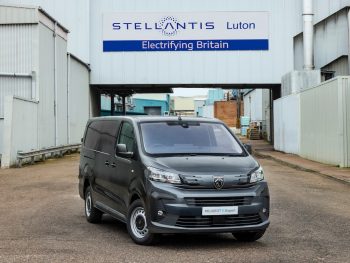Vauxhall and Peugeot owner Stellantis has announced a proposal to close its Luton plant and consolidate production at Ellesmere Port.
 The global vehicle maker said the proposal was being made within the context of the UK’s ZEV mandate. The announcement follows warnings from Stellantis earlier this year that it might stop production in the UK if the Government didn’t take action to encourage the switch to electric vehicles.
The global vehicle maker said the proposal was being made within the context of the UK’s ZEV mandate. The announcement follows warnings from Stellantis earlier this year that it might stop production in the UK if the Government didn’t take action to encourage the switch to electric vehicles.
Stellantis has started a consultation with its employees and trade union partners on the proposal, which would turn Ellesmere Port into its sole UK commercial vehicle manufacturing hub, backed by a £50m investment.
The group was due to start production of the group’s medium-size electric vans at Luton from the first half of 2025, following the start of small electric LCV production at Ellesmere Port in 2023.
If the proposal is implemented, the company said it would deliver a comprehensive support plan for impacted employees in Luton, including relocating hundreds of jobs to Ellesmere Port and providing dedicated job support within the very dynamic Luton area, where new third-party activities could be considered.
Stellantis said it intends to remain the UK market leader in sales of electric LCVs in the country under the “stringent” UK ZEV mandate and will continue to be the only volume manufacturer of LCVs in the UK.
A government spokesperson said: “While it’s encouraging to see Stellantis investing in the future of its Ellesmere Port plant, we know this will be a concerning time for the families of employees at Luton who may be affected.“We have a longstanding partnership with Stellantis and we will continue to work closely with them, as well as trade unions and local partners on the next steps of their proposals.“The government is also backing the wider industry with over £300 million to drive uptake of zero emission vehicles and £2 billion to support the transition of domestic manufacturing.”
A Unite spokesperson said: “The proposal that has been tabled today has been a complete slap in face for our members in Luton, where Vauxhall vehicles have been manufactured for 120 years. Whatever the positive benefits this plan may have for Ellesmere Port, that is not acceptable.
“We stand ready to support our members in doing whatever we can to ensure that historical vehicle manufacturing is maintained in Luton and we call on the Government to do the same.”
The Government is coming under increasing pressure to revise the ZEV mandate – which came into effect in January 2024 and sets incremental targets for car and van makers to sell zero-emission vehicles in the UK ahead of the full ICE ban in 2035.
According to reports, a consultation on the ZEV mandate is due to be announced today, after Transport Secretary Louise Haigh and Business and Trade Secretary Jonathan Reynolds met last week with vehicle makers including Stellantis, Nissan and Ford, as well as charging firms, to discuss a downturn in EV demand and manufacturers’ concerns over the EV rules.
Speaking last week, Haigh said she would look at “flexibilities” but insisted that the mandate “will not be weakened”. The Government later confirmed that it was “committed to reinstating the 2030 phase-out of cars solely powered by internal combustion engines and delivering the ZEV transition in a way that also supports UK economic growth”.
Ministers are reportedly refusing to back down on the sales trajectories, deadlines for the penalties and the level of the fines but are open to new “flexibilities”. According to the Financial Times, this could include allowing companies to count British-made cars sold abroad in their sales targets or taking manufacturer factory emissions into account.
Since then, FleetCheck has warned that vans are furthest adrift of hitting their target and need to be at the centre of any ZEV mandate rethink, while the Association of Fleet Professionals (AFP) has said EV mandate “flexibilities” will do nothing to encourage van fleets to electrify and any government help offered to the motor industry should consider electric van demand, as well as supply, to spur fleet uptake.

